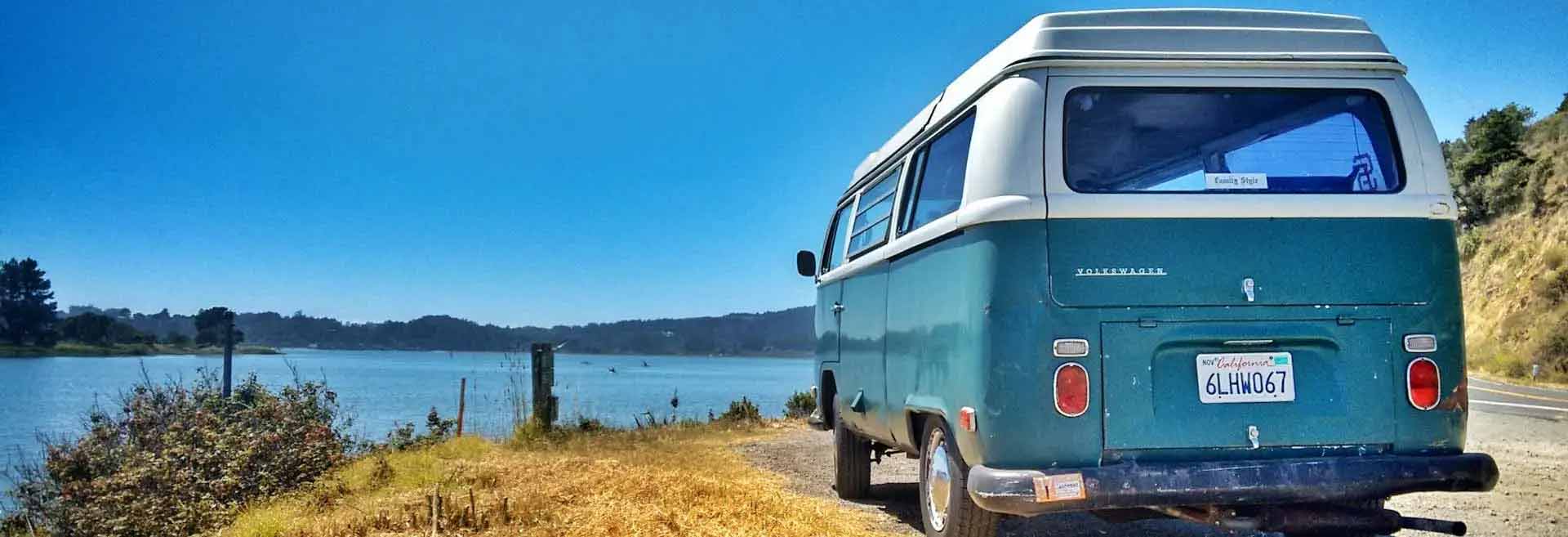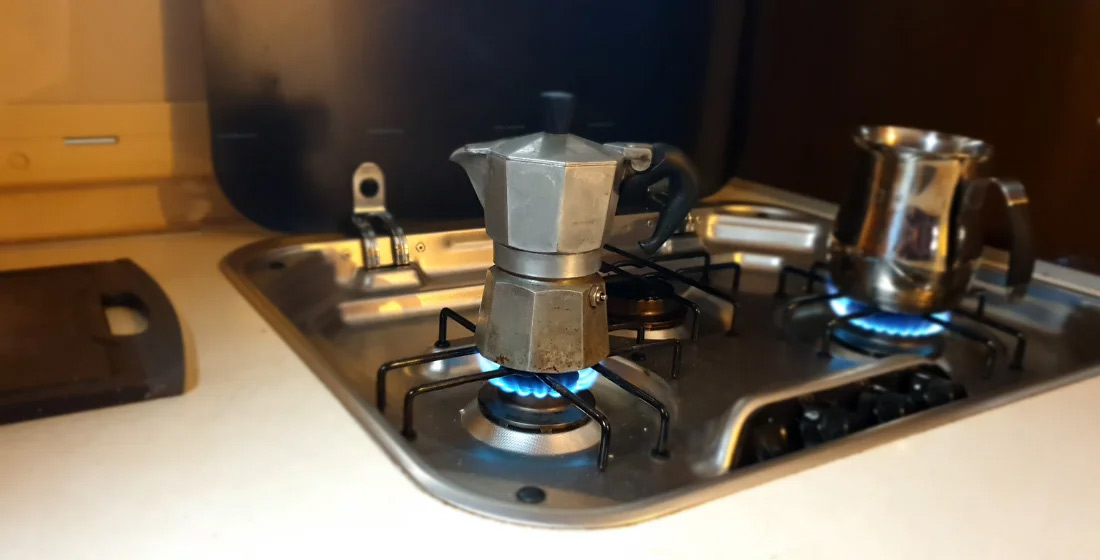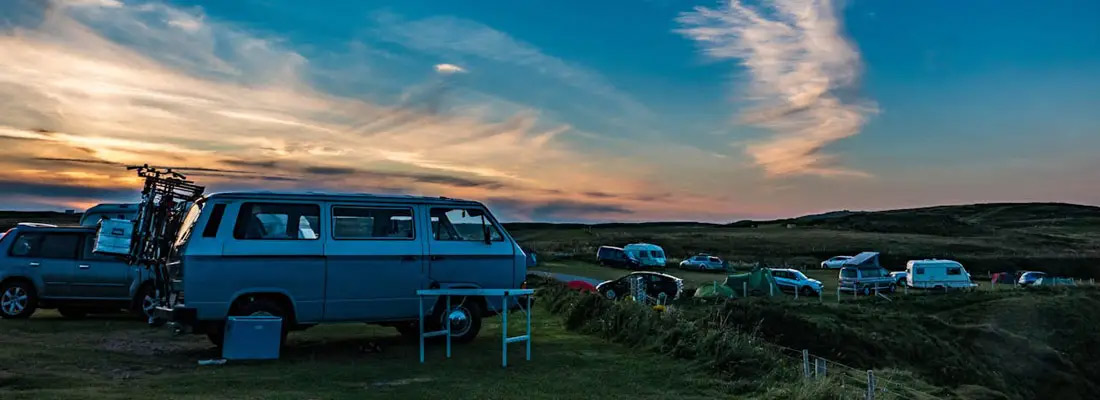If your campervan uses Liquid Petroleum Gas (LPG), you’ll probably want to read this quick blog on how to use and store it safely.
This essential guide will cover the critical aspects of LPG safety in your camper, to help you enjoy a secure and worry-free adventure. We’ll also touch on the importance of securing comprehensive campervan insurance to protect your investment and ensure peace of mind.

An Introduction to LPG in Campervans
LPG, or Liquid Petroleum Gas, is a popular fuel choice for campervans due to its efficiency and versatility. It powers various appliances, including stoves, heaters, and refrigerators, making it indispensable for modern camping conveniences. However, mishandling LPG can lead to severe safety hazards, such as gas leaks, fires, and explosions. Understanding the proper use and maintenance of LPG systems in your campervan is crucial for a safe and enjoyable trip.
Understanding LPG Systems in Campervans
LPG is stored in pressurised cylinders and connected to your campervan’s appliances via a series of hoses and regulators. Here are the main components you need to be familiar with:
- LPG Cylinders: These are the containers that hold the gas. They come in various sizes, commonly ranging from 5kg to 15kg.
- Regulators: Devices that reduce the high pressure of LPG in the cylinder to a usable pressure for appliances.
- Hoses and Piping: Connect the cylinders to your appliances.
- Appliances: Stoves, heaters, and fridges that use LPG.
Each component needs regular maintenance and inspection to ensure they function correctly and safely.

Safety Tips for Handling LPG in Campervans
Here are a few general safety tips, to help you avoid any issues with the Liquid Petroleum Gas in your camper. If you have any concerns or worries about your LPG system, contact a qualified expert as soon as possible.
Regular Inspections
It’s important to regularly inspect your LPG system for any signs of wear and tear. This should be done a few times a year, especially before and after your camper goes into storage, and while you’re preparing for a long trip away.
Check the hoses for cracks, ensure connections are tight, and look for any signs of corrosion on cylinders and regulators. Regular inspections can prevent leaks and other potential hazards.
Proper Ventilation
Make sure your campervan is well-ventilated to prevent the accumulation of gas, and that ventilation points like gas drains in the floor are unobstructed.
Proper ventilation is crucial to avoid the dangers of inhaling gas or risking an explosion.
Leak Detection
Install a gas leak detector in your campervan, and test it regularly. These devices can detect the presence of LPG and sound an alarm if a leak is detected.
Additionally, conduct a soapy water test on connections to check for leaks. If bubbles form, there is a leak that needs immediate attention.
Safe Storage
Store LPG cylinders upright and secure them to prevent movement while driving. Always turn off the gas supply at the cylinder when not in use. Avoid storing cylinders in enclosed, unventilated spaces where gas could accumulate in case of a leak.
Professional Servicing
Have your LPG system serviced by a qualified professional annually. They can check for issues you might miss and ensure your system complies with safety standards.
If you’ve got any concerns about your LPG system, or you think something isn’t right, then contact a qualified technician immediately.

The Importance of Campervan Insurance
While following these safety tips can significantly reduce the risk of LPG-related incidents, accidents can still happen.
This is where professional LPG installation, regular testing, and comprehensive campervan insurance comes into play.
Having an LPG system fitted to your camper will likely count as a modification, unless your camper left the factory with one already installed, which means you’ll need specialist campervan insurance to be properly protected. Here’s why it’s crucial:
Financial Protection: Covers the cost of repairs or replacement in case of damage or loss.
Liability Coverage: Protects you against claims if you cause injury or damage to others.
Peace of Mind: Ensures you can travel with confidence, knowing you’re covered in case of an emergency.
In Conclusion
Ensuring LPG safety in your campervan is essential for a safe and enjoyable travel experience. By following regular maintenance practices, conducting thorough inspections, and understanding how to handle LPG safely, you can prevent accidents and hazards.
Moreover, securing comprehensive campervan insurance adds an extra layer of protection, ensuring that you and your investment are safeguarded against unforeseen events.
For more information on campervan insurance, visit Just Kampers Insurance and explore the options that best suit your needs. Travel safe and enjoy the freedom of the open road!
So, give us a call on 01256 674522 and let one of our specialist team discuss your requirements. Or Get an online quote today or arrange a call back and let us call you at a convenient time.
